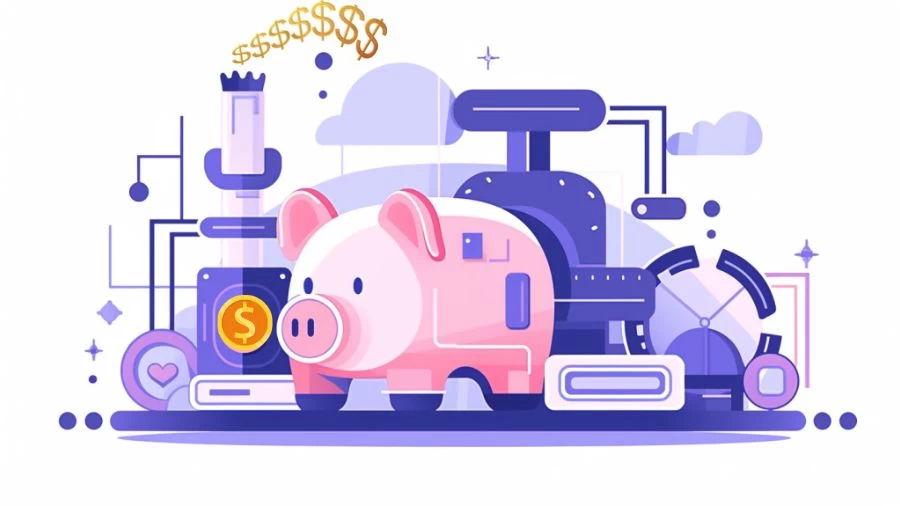
How to Streamline the Savings Process?
To streamline the savings process, consolidate accounts, automate bill payments, and utilize money management apps for efficient financial management.
Published Sep 21, 2023 | Updated Sep 21, 2023 | 📖 8 min read
What is Streamlining?
Streamlining the savings process means making it easier and more efficient to save money. Just like in businesses where they simplify tasks to work better, in saving money, it means finding ways to save with less hassle.
It involves using modern techniques and technology to save money more effectively. When we say we've streamlined the savings process, it means we've made it simpler by removing any complicated or unnecessary steps. This helps us save money without extra stress. So, streamlining the savings process is about making it easier to save and manage our money wisely.
How to Streamline the Savings Process?
In these challenging times, reducing stress is a priority for many. One way to achieve this is by simplifying your financial situation, both for today and your retirement. Streamlining your finances involves consolidating your different accounts and getting rid of duplicate mutual funds, ETFs (exchange-traded funds), and other accounts. So it's often a good idea to make your finances as straightforward as possible:
Combine or close inactive or surplus accounts
Over time, you might find yourself having lots of different accounts. Maybe you got a new credit card to grab a special offer, or you opened another savings account with a higher interest rate. But having so many accounts can become quite a hassle.
You'll have to remember many passwords and keep an eye on lots of balances. According to Stuart Chamberlin, a financial expert, you can achieve most of your financial goals with just one good credit card or brokerage account.
So, to make managing your money simpler, it's a good idea to bring your balances together and close any extra accounts. This not only makes life easier but also reduces the risk of identity theft and ensures you don't forget about small amounts of money in seldom-used accounts.
Utilize a holistic money management application
Once you've sorted out your accounts, simplified your investments, and set up automatic monthly payments, it's a smart move to use a money management app to keep everything in check from now on.
Your financial adviser might offer you access to an app like eMoney, as suggested by Chamberlin. While this app is mainly designed for professionals, it has a client portal that lets you securely store important documents, bring together your accounts, and track your progress toward financial goals.
But there are other options too. Many of the best budgeting apps, such as Mint and Personal Capital, come with powerful money management features. They make it easy for you to oversee your simplified finances in one place.
Determine essential accounts
Once you've set your financial goals and made a list of all your accounts, it's important to figure out which ones are really crucial for your success. In most cases, you'll likely need or want the following:
- A savings account.
- A checking account.
- A retirement account like a 401(k) or IRA.
- A college savings account such as a 529 plan.
- A rewards credit card.
To simplify things, as advised by Galen Bargerstock, a financial expert, gather all your accounts in one place. If you have multiple accounts in the same category, decide which one is your main account that you use the most. You might also consider whether you really need all of them. For example, having one credit card with no interest might be better than having multiple.
Organize your finances into categories
It might sound strange, but organizing your money into different accounts for different purposes can make managing your finances easier. While you don't want too many accounts, having separate ones for things like emergency savings or retirement funds makes it straightforward to track your progress toward specific financial goals.
For example, you might have separate accounts for bills, emergencies, vacations, and retirement savings. By keeping your money organized this way, you can easily track your progress toward each goal and avoid mixing funds meant for different purposes.
Review your investment choices
Simplifying your investments is important, and you don't need multiple brokerage accounts unless you're a sophisticated investor with a lot of money, according to Chamberlin.
Having multiple accounts can make it challenging to ensure you have the right mix of investments that align with your goals and risk tolerance. Plus, if you have more than one financial advisor, you might get conflicting advice.
Chamberlin suggests reviewing the funds where your money is invested. Many people have multiple mutual funds with the same goal, he says. Instead, it might be easier and more cost-effective to invest in two or three low-cost ETFs (exchange-traded funds) instead of having numerous mutual funds.
Establish a financial strategy
Creating a solid financial plan is crucial for effective money management. It ensures that you have the appropriate accounts and strategies in place to achieve your financial goals. To put it simply, not having a financial plan is like not knowing what you want to cook for dinner.
In this analogy, your mix of accounts and investments is similar to the recipe you need to follow to achieve your financial objectives. To create a basic financial plan, list your accounts, assets, and debts, and then prioritize your financial goals.
Automate bill payments
Automating bill payments is a smart move because it helps you avoid missed payments, which can lead to expensive late fees and other charges. This simplifies your financial life and also saves you money.
There are two ways to set up automatic payments: through your bank or directly with the company or individual you owe money to. When you choose the payment date, make sure it falls after your payday to ensure that there's enough money in your checking account to cover the bill.
Streamlining Financial Processes for Growth
The finance department of an organization oversees all the money coming in and going out. They make sure payments are made and received correctly. But when a company grows really fast, there's more paperwork and invoices to handle. Project managers often ask the finance team for budget reports, which can put a lot of pressure on them. This can be risky if they can't keep up with the growth. Hiring more people might seem like the solution, but it doesn't fix the root problem.
One way is to give more responsibility to budget managers who are not in the finance department. They can automate the budgeting process by creating an online dashboard with budget details for each project manager. This way, project managers can quickly access their budget reports and see how their decisions affect the company's finances. It's a solution that helps the finance team handle the company's growth more effectively.
What Are Efficient Saving Strategies?
Efficient saving strategies are practical approaches to managing your money wisely. They encompass various methods to help you save and grow your finances effectively. Automating your savings by setting up regular transfers, creating a budget to track income and expenses, and establishing an emergency fund are some key strategies.
Additionally, reducing high-interest debts, investing for the future, setting clear financial goals, and consistently monitoring your progress are vital components of efficient saving. These strategies provide financial security by preparing you for unexpected expenses and long-term goals. They also make your money work for you, enabling it to grow over time, ensuring a stable and prosperous financial future.
How to Maximize Your Savings?
To maximize your savings, you can follow several practical steps. Start by creating a budget to track your income and expenses. This helps you identify areas where you can cut unnecessary spending. Automate your savings by setting up regular transfers to a dedicated savings account. Reducing high-interest debts, such as credit card balances, frees up more money to save.
Consider investing your savings to earn potential returns over time. Setting clear financial goals gives you a target to work towards. Finally, regularly review and adjust your savings plan to ensure it aligns with your objectives. These strategies will help you build a stronger financial foundation and achieve your savings goals more effectively.
Why is Streamlining the Savings Process Important?
Streamlining the savings process is important because it simplifies your financial life and helps you achieve your savings goals more effectively. When you streamline, you consolidate accounts, reduce unnecessary complexity, and make it easier to track your progress.
This not only saves you time but also reduces the risk of overlooking important financial details. By having a clear and efficient savings process, you can better manage your money, avoid missed opportunities, and stay focused on your financial objectives. In short, streamlining helps you make the most of your savings efforts and ensures your financial journey is more manageable and less stressful.
How to Streamline the Savings Process - FAQs
1. What is the first step to streamline the savings process?
Start by creating a comprehensive financial plan.
2. Should I keep all my accounts, or is it better to consolidate them?
It's often beneficial to combine or close inactive accounts for easier management.
3. What role do money management apps play in streamlining savings?
Money management apps help track and manage your finances in one place.
4. Why is it important to determine essential accounts?
Identifying key accounts ensures you focus on what matters most for your financial goals.
5. How can automating bill payments simplify the savings process?
Automating payments helps avoid missed deadlines and late fees, saving both time and money.




